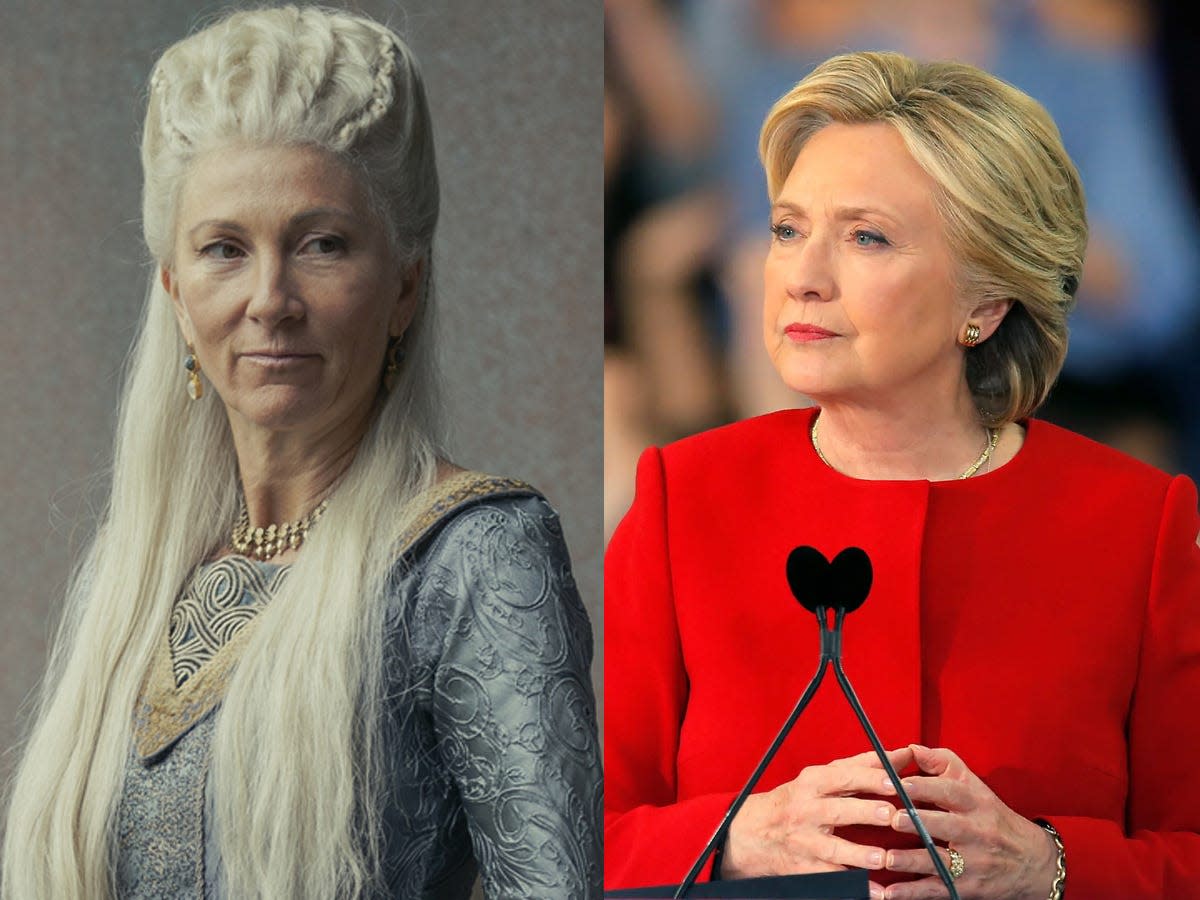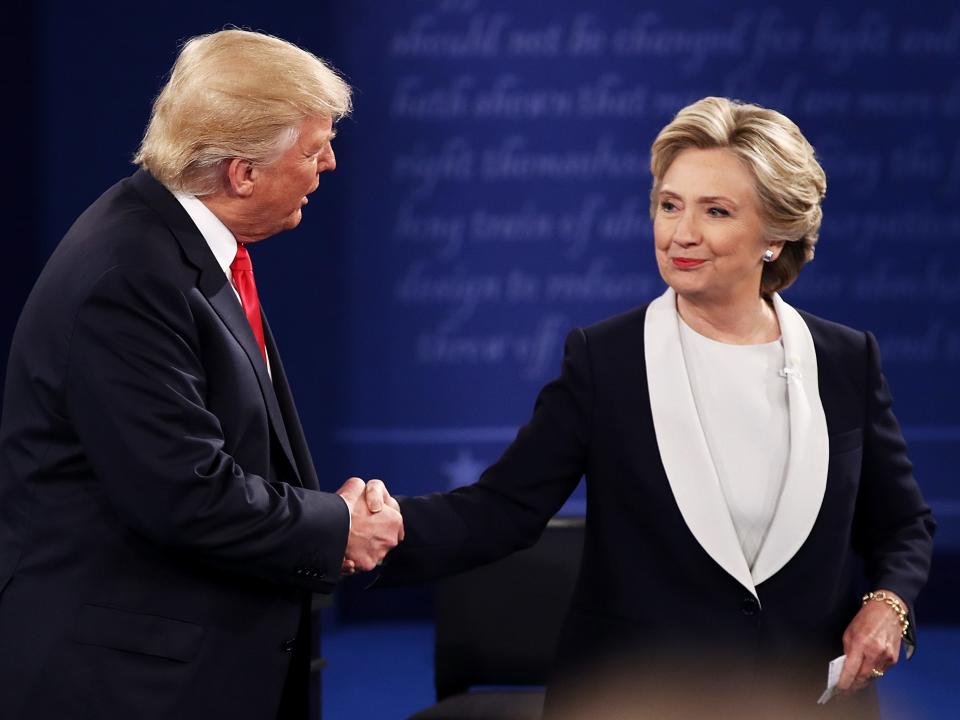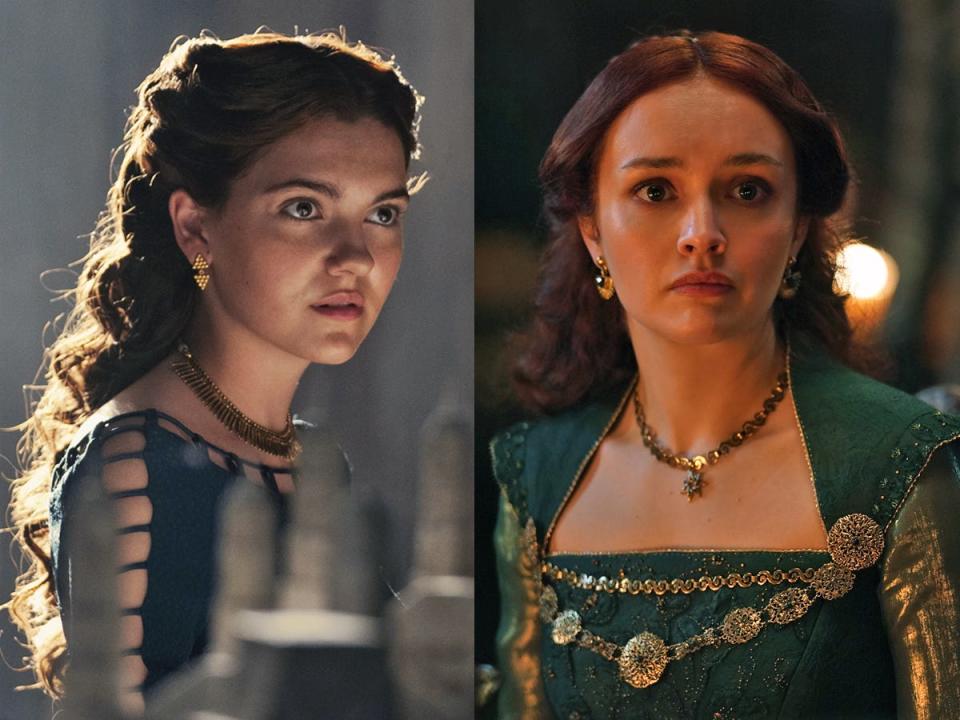The 'House of the Dragon' stars are comparing their characters to Trump-voters and Hillary Clinton

Eve Best, who plays Rhaenys Targaryen, compared her "House of the Dragon" role to Hillary Clinton.
Rhaenys is known in the fictional realm of Westeros as "The Queen Who Never Was."
Actor Olivia Cooke also told EW that there's a parallel between Alicent Hightower and Trump-voters.
HBO's "House of the Dragon" tells the story of an infamous political rivalry in the fictional world of Westeros known as the Dance of the Dragons, and two of the show's stars have compared their characters to two of the most prominent political opponents in recent US history: President Donald Trump and Democratic presidential candidate Hillary Clinton.
Eve Best, who plays Rhaenys Targaryen in the HBO fantasy series, says her character has a lot in common with Clinton when it comes to the former Secretary of State losing the 2016 election. Within the fictional story, Rhaenys was a candidate for heir to the Iron Throne, but she was overlooked because she is a woman (even though she was the only one who came from the direct line of King Jaehaerys' firstborn son).
In the pilot episode of "House of the Dragon," Rhaenys is sitting with the rest of the royal family at a tournament when she is asked for her "favor" and referred to as "The Queen Who Never Was."
"What happens in the tournament is just a classic example of just people endlessly reminding her of the greatest wound of her life," Best said during a roundtable interview with Insider, Popsugar, and Metacritic ahead of the first season's premiere.
Best went on to say that she had spoken with the creative teams behind the scenes about Clinton.
"There were lots of resonances with that whole situation that she was in — clearly being the best candidate for a job," Best said. "And then what do you do in the aftermath of that rejection? How do you handle it? Because the instinct to escape and to just retreat and retire or bury your head in the sand and have nothing more to do with politics and to just go on holiday for the rest of your life ... it's very strong, but actually she can't."

"Hillary, gosh, I had such respect that woman for having to pick up the pieces of your self respect and take it on the chin and exist as a public figure with grace and positivity and good humor," Best continued. "To deal with the constant blows and the constant reminders and continue to have a calm and equanimous approach."
Best wasn't the only one who had conversations about real-world politicians and how they might be resonate with "House of the Dragon" characters.
Olivia Cooke, who plays adult-Alicent Hightower starting in Sunday's sixth episode, told Entertainment Weekly that showrunners Ryan Condal and Miguel Sapochnik gave the following direction for her character: "She's like a woman for Trump."
"I just didn't want to give them any more mental real estate than they already had," Cooke said, reportedly referring to the entire Trump family. "So I tried to find a different route into her, but I could see what they were saying with this complete indoctrination and denial of her own autonomy and rights. I just couldn't be asked to go down that road."
Alicent's character began the story very closely bonded to Princess Rhaenyra, who was named heir to the Iron Throne by her father King Viserys (the man named ruler instead of Rhaenys at the Great Council). But by the sixth episode, we can see how Alicent and Rhaenyra's relationship has turned fully adversarial. Alicent no longer supports Rhaenyra's claim to the Iron Throne, and instead would prefer for her own son to inherit the crown.

As we outlined in this deep dive, "House of the Dragon" is showing how systems of patriarchal rule make it incredible difficult for either Rhaenyra or Alicent to achieve any sense of power.
When Cooke refers to "indoctrination," she appears to making comparisons between her fictional character and real women in the US who vote for candidates like former president Donald Trump, a candidate who had sexual assault allegations made against him in the lead-up to the 2016 election and whose policy approach disenfranchised women's bodily autonomy.
In November 2020, The Cut interviewed a political science professor about the "large number of white women who helped solidify Donald Trump's victory."
"These women have agreed to accept second-class status with their gender, as long as the Republican Party puts them first with race and keeps them safe," Professor Jane Junn said.
In many ways, Alicent's story in "House of the Dragon" mirrors this trajectory so far. She abides by the duties asked of her by men — like her father, Otto, and her king and eventual husband, Viserys — even to the detriment of her own wellbeing.
"House of the Dragon" season one is currently airing Sundays on HBO. For more analysis of the series, read our breakdown here of the best details you might have missed in the latest episode.
Read the original article on Insider


